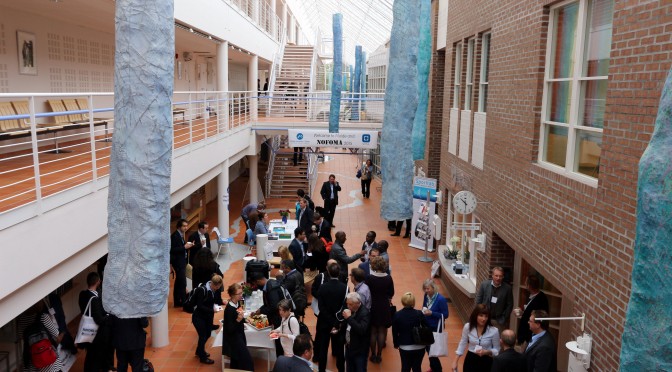The main part of NOFOMA conference at Molde University College started in the morning of 4.6. Essentially the main program of that day consisted of four parallel presentation sessions taking place in different class rooms of Molde University College. Academics from all around the world presented their papers approved by the conference committee. The topics of all presentations were somehow connected to logistics and supply chain management.
Photo by KRYSTOF DIATKA

The areas of interest varied. For example the presentation of Malin Göransson coauthor and presenter of the Enablers and Hinders for Eco-Innovations in Supply Chains- Evidence from Literature paper opened a gateway to the research project they are carrying out at the Lund University in Sweden.“ The aim of this research is to imply usage of a dynamic shelf life of groceries instead of the static which is used today“ Said Malin Göransson.
In other words the static shelf life is measured by common expiration date or „best before“ present on almost all goods which could be bought in a grocery store. The flaw of this system is that the expiration date is based on estimation which does not reflect the actual state of the item. This might lead to premature discarding which, while taking place inside of a supply chain, hurts the producer. Not to mention the food waste which is a large social problem. The suggested dynamic shelf life is based on the actual state of the nutritive.” So far we are using a sensor measuring the temperature in the crate with the product sending the information to the cloud. There based on a certain algorithm the actual expiration date is computed.” Added Malin Göransson. The whole project is still in a research phase. But if applied as intended, every single food item would be fitted with individual sensors measuring not just the temperature but other variables as well. Malin Göransson believes that this could lead to general extension of shelf life of groceries and potentially to reduction of food waste.

On the other hand, according to coauthor and presenter of the paper Reducing Food Waste- Effects of Increasing Supply Chain Responsiveness and Extended Relationship Collaboration believes that extension of shelf life does not lead to extensive reduction of food waste. In his presentation he argued that products with longer shelf life are simply scheduled to stay in warehouses longer which is where much of the food wasting within supply chain takes place. In his paper Prof. Lars- Erik Gadde for example suggests to apply more of a Make to Order production approach ,instead of currently preferred Make to Stock, within the food industry. Among other measures this could lead to reduction off food waste and all the negative impacts related.

